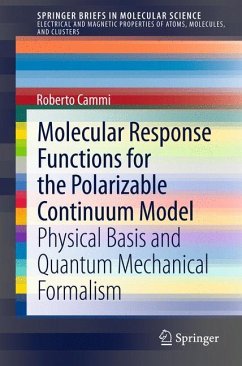
Basis Sets in Computational Chemistry
Versandkostenfrei!
Versandfertig in 6-10 Tagen
98,99 €
inkl. MwSt.

PAYBACK Punkte
49 °P sammeln!
This book addresses the construction and application of the major types of basis sets for computational chemistry calculations. In addition to a general introduction, it includes mathematical basics and a discussion of errors arising from incomplete or inappropriate basis sets. The different chapters introduce local orbitals and orbital localization as well as Slater-type orbitals and review basis sets for special applications, such as those for correlated methods, solid-state calculations, heavy atoms and time-dependent adaptable Gaussian bases for quantum dynamics simulations. This detailed ...
This book addresses the construction and application of the major types of basis sets for computational chemistry calculations. In addition to a general introduction, it includes mathematical basics and a discussion of errors arising from incomplete or inappropriate basis sets. The different chapters introduce local orbitals and orbital localization as well as Slater-type orbitals and review basis sets for special applications, such as those for correlated methods, solid-state calculations, heavy atoms and time-dependent adaptable Gaussian bases for quantum dynamics simulations. This detailed review of the purpose of basis sets, their design, applications, possible problems and available solutions provides graduate students and beginning researchers with information not easily obtained from the available textbooks and offers valuable supporting material for any quantum chemistry or computational chemistry course at the graduate and/or undergraduate level. This book is also useful asa guide for researchers who are new to computational chemistry but are willing to extend their research tools by applying such methods.














